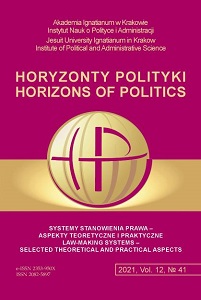Postrzeganie ryzyka prowadzenia działalności gospodarczej w dobie pandemii COVID-19
Perception of Business Risk in the Time of the COVID-19 Pandemic
Author(s): Małgorzata Rembiasz, Paulina SiemieniakSubject(s): National Economy, Business Economy / Management, Organizational Psychology, Health and medicine and law
Published by: Uniwersytet Ignatianum w Krakowie
Keywords: risk; entrepreneurship; the COVID-19 pandemic;
Summary/Abstract: RESEARCH OBJECTIVE: The scientific aim of the article is to assess the perception of risk in business by young people – potential entrepreneurs. The analysis of the literature on the subject and the results of research on the con sequences of the COVID-19 pandemic for the Polish economy prompted the authors to attempt to examine attitudes towards entrepreneurship, which may significantly determine the development of the SME sector in Poland in the near future. PROBLEM AND RESEARCH METHODS: Risk is an inherent part of running a business that cannot be eliminated or avoided. The COVID-19 pandemic has affected almost all areas of human life. The theoretical part uses a critical analysis of the literature on the subject. In the empirical part, the method of online surveys of students from a private university with an economic profile was used. THE PROCESS OF ARGUMENTATION: The first part describes the definition of risk, and then the research methods used in the article. The second part describes the theoretical problems related to: the general understanding of the meaning of risk, the concept of risk in business and classification of its sources, the experience of the entrepreneur’s uncertainty, the relationship between risk and threat, human attitudes towards risk in the context of the COVID-19 pandemic. The next part presents the results of empirical research on the perception of risk by potential entrepreneurs. The last part of the article is a summary of the analysis of the literature on the subject and own research, as well as the proposed directions of future research. RESEARCH RESULTS: The results of empirical research proved that a relatively large group of respondents, as much as 48.8%, was interested in running their own business. In addition, as many as 60.9% of respondents said that the pandemic did not affect their plans to start their own business. Importantly, over 70% of respondents assessed running their own business as risky, and yet they plan to take such a risk consciously. CONCLUSIONS, INNOVATIONS, AND RECOMMENDATIONS: The authors believe that it is worth strengthening the entrepreneurial attitudes of young people. An appropriate recommendation for the creators of education programs in this area seems to be the need to emphasize the topic of risk in the economic education of students. The results of the research conducted give hope that thanks to the work of young people who have the ability to adequately respond to difficult external conditions, the SME sector has a chance to overcome the negative effects of the pandemic.
Journal: Horyzonty Polityki
- Issue Year: 12/2021
- Issue No: 41
- Page Range: 91-106
- Page Count: 16
- Language: Polish

